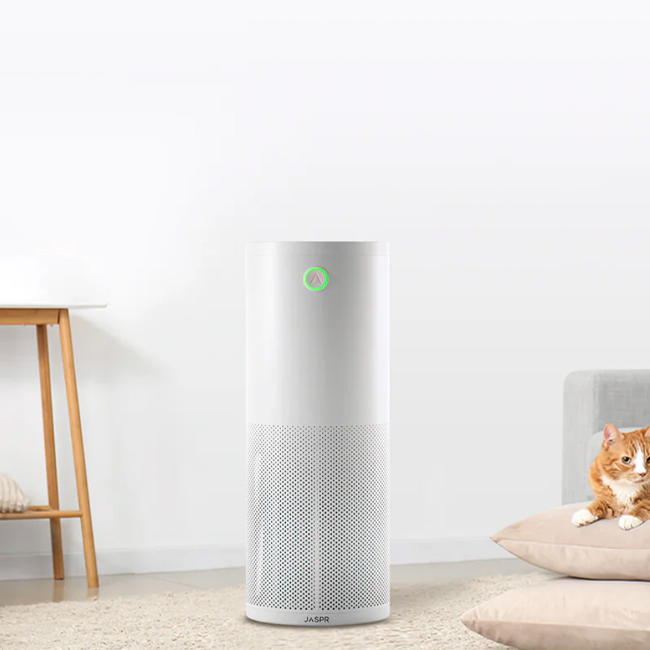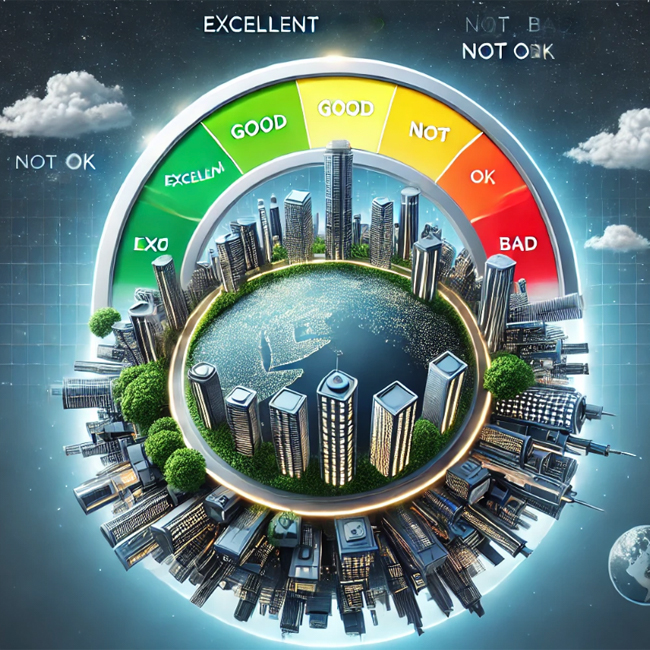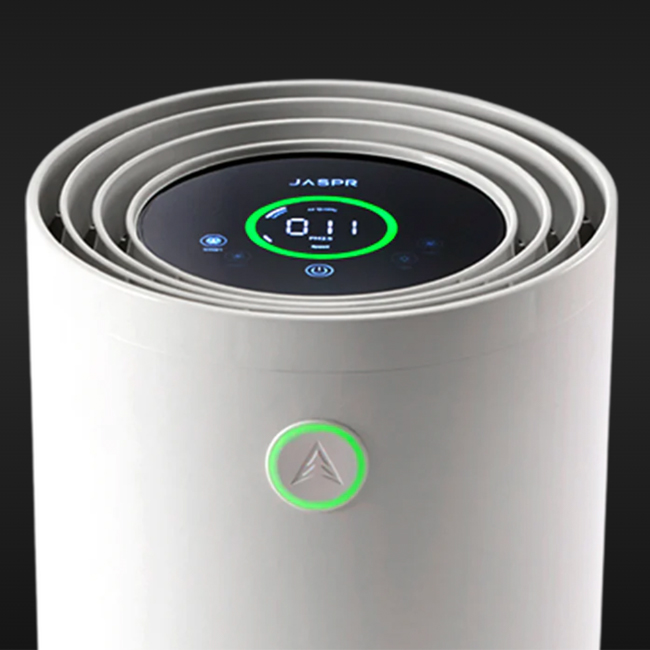Air. It’s really, really, really important! So, why does it seem that we talk so little about it? Until there’s a forest fire there is… I realized that I’ve done so much on the wellness journey to provide my family with the healthiest options for them. I am very diligent about the food (and water) we put into our bodies, the products we put on our bodies, and even the supplies we use in our house that surround us, from cleaning supplies, to eliminating toxins that sit in the air. And then it hit me…air. What about the air?! That’s when I went down the rabbit hole, and it lead me to Jaspr! I love how Jaspr not only helps clean the air, and makes me feel like I’m creating a healthy home environment for my family, but that it also gives me a visual in numbers on the difference it’s making! So, let’s summarize this rabbit hole with the creator of Jaspr, Mike!

Hi Mike! I’m so glad we became connected! I love your mission, and how you are trying to inform people about air quality, beyond also selling a great product. But saying that, your brand – Jaspr – is incredible! So, let’s get started talking all things air!
Looking at the air outside, is there a hard cut-off for when you won’t go outside, and when you won’t allow your kids to go outside? What numbers are you looking at, and where’s the best place to get this information?
When I lived in British Columbia, which would be similar for anywhere on the West Coast (and now kind of everywhere), when there would be wildfire smoke, when the AQI or the PM2.5 was over about 100, that’s when I would not go outside. But, I have the caveat that that’s because I have a bunch of Jaspr‘s at home, and my air quality at home is excellent. For most folks, if they don’t have air filtration dialed in, they are almost no better off staying inside than outside, because your home is not an air filter. So, just because you have the perception of walls and doors around you, doesn’t mean those walls and doors are cleaning the air. So, my 100 threshold is because I can keep my own indoor air quality very low. For most folks, when it’s 250 outside, it’s still like a 200 inside – it’s not much cleaner. During a wildfire, it smells a little bit cleaner, just because there’s less smoke in the home, but that doesn’t mean there’s less harmful particles.
That information can be found online, a lot of weather networks do carry it. If you Google your city and air quality, you’ll typically see it. The metric that you’re looking at is AQI, which is Air Quality Index. The main prevalent to really focus on is PM2.5, which is Particulate Matter Under 2.5 Microns In Size, which means super small particles, that are small enough to harm your lungs and blood stream.
Outside, it’s really pollen and mold that are big problems, and the problem is that those don’t really show up in the Air Quality Index. So if someone types in Pollen and Allergen levels in their area, that can also be a really good way to do it, because Mold will not show up in AQI, but it’s a big problem. Spring and seasonal allergens can be in most of the air in some places. But remember, outdoor air comes inside.
What are your recommendations for ways people can still get outside during what I’m now going to call “wildfire season”?
That’s what I call it too! Pretty much June to the end of September, even though big fires can happen in May and October too. That’s a third of the year that can be wildfire season! We used to call it Summer.
I mean, leave the smoke, honestly. Someone could use a N95 mask tightly fitted or even a P100, but now you’re walking around with like a scuba mask on, which isn’t much fun. So, if I’m in a wildfire smoky city, I’m indoors, my air filtration system is cranking. If someone is going to be in a smoke zone, you either need to get out of the smoke zone, to not be breathing the smoke of everything that the wildfire has also burnt. Stay inside with filtered air or don’t be there if you can avoid it.

If the air is bad outside, that means it’s bad inside too. Can you talk a little about this, and in fear of stating the obvious, why air quality is important?
I touched a little bit on the inside-outside, but there’s a term called nose blind, which basically means no one can smell the campfire at the campfire. It’s when you leave or come inside that you realize, “I smell like smoke.” You don’t notice it when you’re in it. Which is the same reason we don’t notice most bad air. Which is the same reason fish don’t notice bad water.
Air quality is important because we have three major things that we consume to keep ourselves alive. Food, water, and air. We can get into more stuff, you know, absorption, and sun,but…food, water, and air, are three major intakes. A person typically eats 2 pounds of food, and 2 litres of water, but breathes 11 thousand litres of air per day! So, you’re talking 5000 times more than the amount of water that you drink. And all the same harmful stuff that you can get through your water, you can also get through your air. So folks often worry about water quality, or clean food, but they’re not even thinking about what they’re breathing. So, all the same kind of stuff that applies to bad water and food, applies to bad air. Bad air can cause inflammation, it can exasperate asthma and allergies, it can mess up your sleep quality. If you’re thinking about drinking pond water and eating a BigMac, that’s the same thing breathing poor air can do to you in a different way. Air is your sleeping fuel. It is your thinking fuel. Air is how you get oxygen, which powers your cells, which drives everything! So, you know, you don’t want to put bad fuel in a nice car or your car is not going to run as well – your engine is not going to last as well. You want high quality air for high quality performance, high quality sleep – it’s just the number one fuel source. I couldn’t be talking to you right now if I wasn’t able to breathe. The human body is quite amazing at adapting, so people often ignore the horrible air even when they are in it. Air is pretty important! People may be able to fast from food for a few weeks, fast from water for a few days, but see how long you can fast from air.
Our air quality inside is also impacted by what we are using for cleaning supplies, fragrance, and a number of other things. Do you mind sharing a list of what things impact the air quality inside our homes?
I will first categorize this whole topic by indoor and outdoor pollution.
Outdoor pollution is pollen, mold, smoke, allergens, construction, smog – all kinds of stuff!
Indoor pollution can also be mold, but the sources you’re talking about…hair sprays, cooking is one of the worst things for indoor air, pets – their allergens and furs, cleaning products, fragrances, humidifiers, diffusers, candles…these all can be quite toxic. And they are fine if you use them outside under adequate ventilation. Same way if you cut a piece of drywall outside, the environment can handle a certain amount of particulate. But inside, it’s trapped. The problem with that is now it gets embedded in your carpets, your furniture, your clothing, your paint and walls, in your insulation, and it can’t get out.
Can we talk gas stove tops – how bad are they for the air quality? And does turning the fan on make a huge difference?
They are bad, usually. It does make a huge difference turning on the fan. Most range hoods are undersized – some don’t actually vent outside – they just vent into the cabinet or attic, especially in condos.
Range hoods should be much closer to the stove than they are and they should be much more powerful. Another tip, if you can use the back burner when you’re cooking, the range hood will collect more. But, the range hood is quite effective! The problem is that they are loud and annoying.
I’ve never tested the air in a home that had a gas stove that didn’t have some background amount of of carbon monoxide. Some will say there’s a safe limit of carbon monoxide. There’s certainly an amount that isn’t deadly, but the long-term effects of chronic carbon monoxide poisoning and impact isn’t well understood, and sometimes those levels are quite high. Sometimes the gas doesn’t combust properly and there’s even more carbon monoxide in the home.
We have a gas stove in our home – I would never put one in, and I might even swap this one for induction, but if someone is cooking anything, I would always have the the range on fan speed 1. What’s even better, if weather permits, is cracking a few windows. When you’re cooking in general, having good ventilation to get all the cooking particles out of the house is a great idea.
Is there any other big elements we should be taking into consideration in our home – like furnace modifications, certain building materials, etc.?
Most of these things are most effective when you’re building a new home from scratch and you can kind of do whatever you want. The effectiveness is quite limited in retrofitting an existing home. And that’s where Jaspr is amazing, because you can just plug-in and purify. As for the systems that go into your HVAC…the furnace is really designed to heat and cool your home, so when you add purifiers to your HVAC system, there’s a few reasons it doesn’t work. When your furnace turns on and off, and hopefully it’s off most of the time, so you can be energy efficient and not listen to a loud furnace, but…when the furnace fan is not running, the air is not being circulated and your air is not being filtered. If you think about a pool, you typically want your filter pump running 24 hours a day, and then your pool heater kicks on when it needs to. The problem is that when you do this with an HVAC system, your furnace turns on and off based on temperature, so the air is not circulated and it’s not being cleaned.
Also, your furnace was not designed for signifcant added air filtration systems, so it adds more resistance, it adds a pressure drop, it makes your home much less effective at heating and cooling, and it can damage the furnace – it’s not what the furnace was intended to do – it doesn’t work very good. It’s like if you have a Honda Civic and you soup up the engine, it’s still not good for towing tractors and trailers – you need a truck for that.
Building materials – you could build a home with mold-resistant materials and stuff like that, but generally these things come in when building a healthy custom home. I still believe good ventilation and good air flow and good air filtration is the best thing. Then, let materials off-gas – if you buy a new couch or bed, let it breathe. If you’re painting, if you can keep all your windows open for a couple weeks, that’s ideal! The same thing keeps holding true – let things breathe. Air flow – good. Air ventilation – good.

Does having plants in the house improve air quality? Is there anything that increases their ability to clean the air inside?
Not really. It’s a cute idea. NASA did a plant study, but it’s like trying to heat your whole house with a space heater. A space heater is great for a small room or a small condo. Or it’s like trying to heat your swimming pool with a kettle. Plants can theoretically clean the air, but they can also mess up your humidity, and they can bring pests into your home. I love plants for the ambiance and the nature vibe, and I think there’s lots of intangible benefits of having plants inside the home, but I still think the same is true – you want good adequate ventilation for the plant, and for yourself.
If you take a Jaspr and take it into a bedroom and someone uses a vaporizer or smokes something, or lights a match or a candle, you’ll see the smoke, you’ll see that particulate jump, you’ll see the Jaspr clean it up and the number go down. I’ve never seen a tree or plant make this number go down. So, I don’t think it’s effective the same way that an air purification system is.
What can you share about Radon in homes? Is this in your realm of knowledge?
It is in the realm of my knowledge, because I used to do air quality consulting. Depending on the country, it’s measured in different ways. Radon is from the decaying of uranium underground. They say it’s the leading cause of cancer after smoking. I’ve never gone deep down this. Once again, ventilation is the best thing. If you have an air tight home, that’s not great. Air filtration systems can be a little bit helpful for Radon, but not totally. There are things called Radon Mitigation Systems, where it basically puts a vacuum in the slab under your house to depressurize it. So instead of that Radon coming in your house, it vents it out of your house. Good air flow, windows open occasionally, and fresh air is good. You can look online for the most prevalent areas of Radon, and if you’re in a high Radon zone, you could do a Radon test, and if you have high levels of Radon, then you could absolutely put in a mitigation system for a few thousand dollars.
Not sure if this is beyond your scope, but if you’re worried about mold in your home, do you have suggestions/recommendations?
Mold is the most in my scope, because my background was in wildfire restoration and mold remediation and toxic clean-ups. Mold is an issue! Mold is a big issue. Typically people either underplay or overplay the impact of mold. Unfortunately there’s a lot of tests that aren’t helpful. Usually the tests are designed for false positives or for false negatives. What really matters for mold – if you have visible, physical black mold – you need to find it and remove it. But most people have airborne mold. Mold is outside in high concentrations, but there’s enough UV from the sun and enough fresh air to keep it at bay and it keep it from harming you. Mold inside is a big problem. I’ll also note that typically we find just as much, if not more, pollen levels inside people’s homes as outside. Because all the allergens come in and can’t get out. Mold is similar, but mold can originate from the outside and come in. Mold can also originate inside from leaks and high humidity levels. Once again, the best thing for mold is to filter the air. It’s like no matter what, if you get your water from the city, it’s either going to be chlorinated city water, or bacteria-ecoli-filled well water. The source of the water is always going to have problems, and that’s why you need to filter your water. Air is the same. When you get air, it is going to have insect parts, it’s going to have bacteria, it’s going to have mold, it’s going to have pollen. The good thing is that a good air filtration system in your home is going to mitigate this. So, I am worried about mold. I’ve tested thousands of homes for mold. Typically if you have a good, adequate amount of air filtration systems in the home, then the mold levels will be reduced by 95+% and then it’s not a problem. Very similar to water filtration.
What do you recommend for people’s homes when it comes to the humidity inside the house, especially in places with cold winters to hot summers? And what are your thoughts on humidifiers?
We actually have a great post about this if you want to read more. Most humidifiers don’t filter the water, so what happens is they are ineffective, because they add humidity which is helpful if it’s dry, but the problem is it creates a bunch of particulates in the air. If you use tap water or even bottled water, you air particulate is going to go crazy. You need to use distilled water. Unfortunately, I haven’t found an excellent humidifier that distills the water and filters it out, so it’s filtering out the airsolized water. If it’s too dry, you could either use distilled water, or you could use a humidifier with an air purifier, which is a good blend. If it’s too humid, you want to use an ERV (Energy Recovery Ventilator) or HRV (Heat Recovery Ventilator). ERV’s are usually better, and they can help control humidity from ventilation. If it’s super humid, you can actually get into a de-humidifier. But air conditioners de-humidifiy by nature, so typically if your doors and window are shut, and your air conditioner is shut, that really helps.
Now, onto air purifiers, officially that is! We love, love, love our Jaspr! So although that should be everyone’s first choice, I know you’re all about making sure that the most people possible can get the knowledge they need to have healthy homes. We will talk about what people can do if they don’t have the means to buy all the air purifiers, but first, can you talk about why and how air purifiers work, and what people should be looking for in an air purifier?
Since we’ve last talked, we’ve lowered our prices from $1399, all the way down to $999. But if they have your code, it will be $899 [read to the end to get that!]. So, it’s much more affordable. If people look at the long-term investment. We have a lifetime warranty. We pay the shipping both ways. I think that it’s the best value now at this price point. If someone cannot afford it, I think building their own air purifier DIY-style. You can google this and get some box fans and furnace filters and make a pretty good filter at home. It really depends, because you could also buy an air scrubber, which is just as, or more effective than a Jaspr, but it’s really loud and ugly. We also now have a ‘shop and pay’ on the website, so they can pay in multiple instalments. But honestly, I can’t recommend a small air purifier – there’s a reason we didn’t make one, because they aren’t very effective. We would have made a lot more money having a $299 air purifier, but because they not effective, I refuse to sell something that’s not going to help. But, if someone can’t afford it, there are cheap air purifiers that are okay for a bedroom – you’ll have to run them on full speed, which will make them loud and annoying. So, you kind of need to choose. I like to tell people about the DIY option, because that can be very effective.
I know you have a quiz on your website, but generally how many air purifiers do you find a home would need? How many do you have in your home for example?
The most optimal is one per bedroom and one in the living room. Then you have super clean air in your bedrooms where you sleep and then you have one in your living room and kitchen area to handle the kitchen particulates.
Can you talk about the number rating for the air on the Jaspr – what is the ideal number we want our air to be at?
The number on the screen is PM2.5, which I touched on earlier. Excellent is under 10!
Where can people find you to follow along?
You can follow along on our social media or our website, or listen to us on other podcasts!
Thanks so much for all your time and energy!!

Mike was so gracious to offer everyone who reads this post and shops Jaspr within 1 week of the launch date 20% off their purchase. After that first week, the discount code will still get you 10% off. Use LAURENEB at checkout to get your house all set up with Jaspr!
